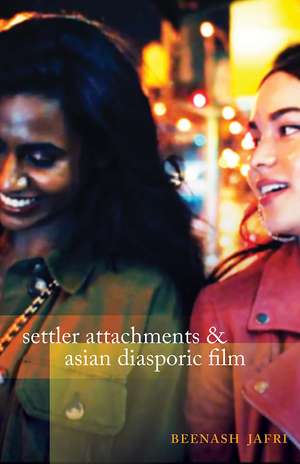Settler Attachments and Asian Diasporic Film
Autor Beenash Jafrien Limba Engleză Paperback – 4 mar 2025
Settler Attachments and Asian Diasporic Film is an interdisciplinary examination of the stubborn attachment of Asian diasporas to settler-colonial ideals and of the decolonial possibilities Asian diasporic films imagine. Beenash Jafri uniquely addresses the complexities of Asian–Indigenous relationality through film and visual media, urging film scholars to approach their subjects with an eye to the entanglements of race, diaspora, and Indigeneity.
Highlighting how Asian diasporic attachments to settler colonialism are structural, she explores how they are manifested through melancholic yearning within the figure of the Asian cowboy in films such as Cowgirl and Wild West and through the aesthetic and representational politics of body and land in experimental films by Shani Mootoo and Vivek Shraya. While recognizing the pervasive violence of settler colonialism, Jafri maintains a hopeful outlook, showcasing how Asian diasporic filmmakers persistently work toward decolonial worldmaking. This emerging vision can be seen in the radical friendship between Ali Kazimi and Onondaga artist Jeffrey Thomas in Kazimi’s film Shooting Indians, in the queer relational survivance depicted in films such as This Place and Scarborough, and in the sensory disruptions of Jin-me Yoon’s interactive art project Untunnelling Vision.
From film and media studies to diaspora studies and critical ethnic studies, Indigenous studies to queer theory, Settler Attachments and Asian Diasporic Film provides a critical framework for engaging cinematic media to understand and imagine beyond the entrenched settler-colonial dynamics within Asian diasporic communities.
Retail e-book files for this title are screen-reader friendly with images accompanied by short alt text and/or extended descriptions.
Preț: 163.04 lei
Nou
Puncte Express: 245
Preț estimativ în valută:
31.20€ • 31.95$ • 25.95£
31.20€ • 31.95$ • 25.95£
Carte nepublicată încă
Doresc să fiu notificat când acest titlu va fi disponibil:
Se trimite...
Preluare comenzi: 021 569.72.76
Specificații
ISBN-13: 9781517918446
ISBN-10: 1517918448
Pagini: 248
Ilustrații: 34 black and white illustrations
Dimensiuni: 140 x 216 x 30 mm
Greutate: 0.37 kg
Editura: University of Minnesota Press
Colecția Univ Of Minnesota Press
ISBN-10: 1517918448
Pagini: 248
Ilustrații: 34 black and white illustrations
Dimensiuni: 140 x 216 x 30 mm
Greutate: 0.37 kg
Editura: University of Minnesota Press
Colecția Univ Of Minnesota Press
Notă biografică
Beenash Jafri is assistant professor of gender, sexuality, and women’s studies at UC Davis. Her writing has been published in GLQ: A Journal of Lesbian and Gay Studies, Settler Colonial Studies, American Indian Culture and Research Journal, Cultural Studies↔Critical Methodologies, and Lateral: Journal of the Cultural Studies Association.
Cuprins
Contents
Introduction: Decolonizing Settler Worlds
1. Melancholic Attachments: Asian Diasporic Cowboys
2. Brown Queer and Trans Bodies at the Impasse of Diaspora and Indigeneity
3. Friendship, Refusal, and Alternate Archives of Diaspora
4. Experiments in Relation: Queer Indigenous and Asian Diasporic Survivance in the Settler-Capitalist City
Coda: Interrupting the Settler-Colonial Sensorium
Acknowledgments
Notes
Index
Introduction: Decolonizing Settler Worlds
1. Melancholic Attachments: Asian Diasporic Cowboys
2. Brown Queer and Trans Bodies at the Impasse of Diaspora and Indigeneity
3. Friendship, Refusal, and Alternate Archives of Diaspora
4. Experiments in Relation: Queer Indigenous and Asian Diasporic Survivance in the Settler-Capitalist City
Coda: Interrupting the Settler-Colonial Sensorium
Acknowledgments
Notes
Index
Recenzii
"Beenash Jafri delivers in this superb appraisal of decolonial commitments in Asian diasporic film. With dexterity and care, she dives into the fraught edges of Asian diasporic solidarity with Indigenous peoples and complicity with settler colonialism. By exploring the way Asian diasporic and Indigenous political relation is mediated by critical impasse, Jafri takes us to a new level of ethical commitment to decolonial struggle." —Iyko Day, author of Alien Capital: Asian Racialization and the Logic of Settler Colonial Capitalism
"This book is a far-reaching study of Asian diasporic media in the context of North American settler colonialisms. Its sustained analysis of ‘affective attachments’ moves us beyond the impasses of immigrant nostalgia and settler inclusion toward what Beenash Jafri, deftly interweaving women-of-color feminism with Indigenous theory and critique, calls ‘relational survivance.’" —Glen Mimura, University of California, Irvine
"This book is a far-reaching study of Asian diasporic media in the context of North American settler colonialisms. Its sustained analysis of ‘affective attachments’ moves us beyond the impasses of immigrant nostalgia and settler inclusion toward what Beenash Jafri, deftly interweaving women-of-color feminism with Indigenous theory and critique, calls ‘relational survivance.’" —Glen Mimura, University of California, Irvine
